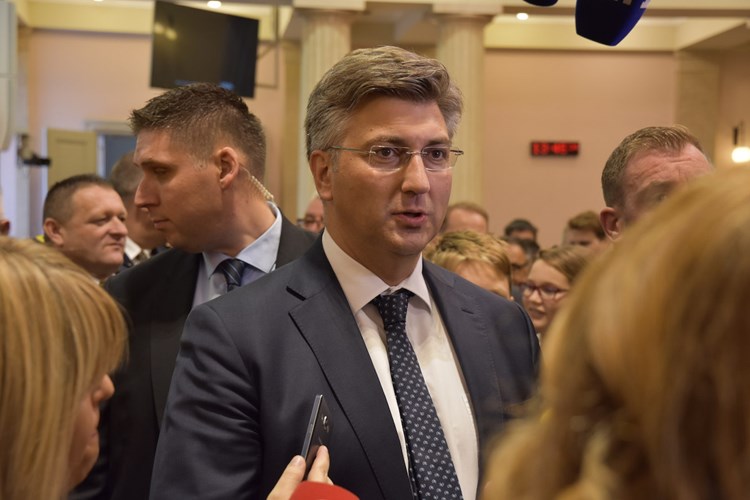- Published: 08.10.2017.
PM says gov't didn't nationalise Agrokor
Prime Minister Andrej Plenkovic on Sunday dismissed Sberbank's claims that the Croatian government had nationalised Agrokor and should therefore repay its debt to the Russian bank, saying that in the case of the indebted food and retail group, a law was in force that enabled an emergency administration for a limited period of time.
Sberbank has been one of the permanent, fully informed members of the temporary creditors council from day one, Plenkovic told reporters.
"Their representatives took part in talks both with the former (Agrokor) management and the government as well as within the coordinating body of the different banks that are the key creditors. They have all the information and I think their lawyers understand very well what the purpose of the emergency administration has been."
He dismissed the nationalisation argument, saying "nationalisation is something else" and that the law on emergency administration in systemic companies provided for such administration for a limited time.
He said Sberbank was one of the major Agrokor creditors and that it had the opportunity and the time "to say what it wants in this process and to participate in it."
"I believe they have a legitimate interest to protect their money. However... when they gave that money, they didn't ask... either me or the government. They are a commercial bank which, I believe, with the proper due diligence, adopted decisions on such big loans and now they are one of the stakeholders in the process of restructuring and settlement," Plenkovic said.
Prime Minister Andrej Plenkovic reiterated on Sunday Croatia's willingness to resolve outstanding border issues through dialogue, in the spirit of good neighbourly relations.
"For us there is only good will, in the spirit of good neighbourly relations, in the European spirit, to solve outstanding border issues with Slovenia through dialogue, to explain to our friends in Bosnia and Herzegovina that the Peljesac bridge... can be (built) nowhere else but on Croatian territory," he told citizens during Open Day in parliament.
Parliament holds an Open Day on May 30, Parliament Day, and October 8, Independence Day. This is the first time that Plenkovic attended, giving citizens an opportunity to ask him questions, which were mainly about foreign affairs.
He dismissed a woman's fear that Croatia was being blocked in everything, from joining the Schengen Area to building the Peljesac bridge.
There are no blockades, in the true sense of the word, at the moment, and the only thing you heard was the expression of disagreement with our ambition to enter the OECD, Plenkovic said.
He confirmed that Croatia had several outstanding issues with its neighbours, saying most dated before 8 October 1991 and that all were more or less "residual issues" stemming from the break-up of the former Yugoslavia and unfinished processes.
Croatia's border policy has been clear throughout that time - the borders of the former republics as of 25 June 1991 were the borders of the independent states created after that, Plenkovic said, adding that it remained to determine the borders and that Croatia relied on cadastral boundaries for that.
Everyone in the government and parliament as well as the president know very well what national interests are, what state territory is, and how attentively and responsibly we are handling those processes, he said.
Foreign Minister Marija Pejcinovic Buric said on Sunday Croatia intended to continue to build stable relations with Russia and confirmed that President Kolinda Grabar-Kitarovic would visit Russia.
Responding to a citizen during Open Day in parliament who asked why Croatia did not have a better policy towards Russia, Pejcinovic Buric said Croatia would continue to build stable relations and develop those it could, notably in the economy and culture.
She said preparations were under way for the president's visit to Russia later this month.
With all countries, notably big and important ones like Russia, we intend to nurture relations that are useful for both sides, Pejcinovic Buric said.
Responding to questions from citizens, Prime Minister Andrej Plenkovic said Croatia had achieved all of its strategic goals such as freedom, democracy and independence, and that now it wanted to meet by the first half of 2019 the criteria for joining the Schengen Area and then the euro area.
As for Croatia's neighbours that want to join the European Union and NATO, he said, "We want (them) to do so based on their own achievements and the criteria, and Croatia will continue to help them in that."
Asked what the government intended to do for the development of the Slavonia region and to stop emigration, Plenkovic said demographic revival was a key economic and development issue. He said the government launched Project Slavonia to use national, EU, private and local government funds to create conditions that would make young people want to stay in Slavonia.
Labour Minister Tomislav Coric said pensions would be somewhat higher next year.
Text: Hina
